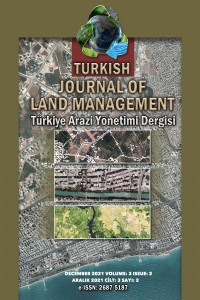Technical Brief
Research Article
Aim & Scope
Turkish Journal of Land Management primarily takes into account the following three basic principles.
1. Sustainable Land Management (Right of Next Generations)
2. Land Management Respecting Human Rights (Property Rights of the State and Individuals)
3. Land Management that Protects the Environment and Ecology (Nature's Right to Life)
In this context, Turkish Journal of Land Management aim is;
Content of Turkish Journal of Land Management;
• Land Management
• Integrated Coastal Management
• Integrated Land and Water Management
• Land Use
• Land Policy
• Cadastre Applications
• Urban Renewal
• Urban and Rural Arrangements
• Real Estate Valuation and Development
• Data standards for sustainable land management
• Control of data and information using laboratory and on-site testing methods
• Integration with Remote Sensing, Photogrammetry and Geographic Information Systems
• Information support for disaster and risk reduction: early warning systems, impact assessment, monitoring, flexibility and risk reduction studies
• Environmental pollution: assessment and impact studies
• Integration of earth science applications in geology, geomorphology and pedology with remotely sensed inputs
• Multi-dimensional monitoring of the growth of agricultural products for sustainable agricultural production and protection of agriculture
• Climate change studies
• Global and regional dynamics of land use / cover, biodiversity, degradation, etc.
• Desertification and drought studies
• Carbon flows in soil, vegetation and inland, coastal and ocean waters
• Water quality studies,… etc.
Research Article
Articles reflecting an original research with its findings and results.
Scanning Article
Review articles of sufficient number of scientific articles, summarize the subject at present level of knowledge and technology, make evaluations and interpret these findings by comparing them.
Short Paper
Articles describing a new method or technique explaining the important findings of a research.
Author Guidelines
For Authors;
Articles submitted to the journal should be studies with the following characteristics.
Research studies containing original scientific findings,
Studies that convey application examples with a scientific approach,
It should be in the form of review studies that comprehensively evaluate significant developments on a particular subject.
Uploading the Article to the System;
Articles should be uploaded electronically to the system at https://dergipark.org.tr/en/journal/3138/submission/start
These articles cannot be published anywhere else and cannot be presented as a paper without the permission of the editorial board. All or part of the article cannot be used anywhere without reference. Authors in the article have to express a consensus on the order of names.
Writing Rules
You can use the sample file written in accordance with the spelling rules while writing your article.
Sample Article (docx)
Files waiting to be sent with the Article
Template (docx)
Files waiting to be sent with the Article
1*. Plagiarism Report: If the plagiarism report is not attached, the editorial board has the right to directly reject the article by checking whether there is plagiarism in iThenticate or turnitin . If any manuscript is 30% plagiarized the article will be rejected and the author will be notified.
2*. Copyright Transfer Form: The copyright transfer of the articles is taken by filling and signing the form presented on the journal website. Copyright Transfer Form must be downloaded, signed, passed through the browser and uploaded to the system as PDF. Publications of authors who do not submit this form cannot be published.
Copyright Transfer Form (docx)
3*. ORCID ID Form: ORCID ID Form which shows the identity number of the authors in the international platform must be filled in and uploaded to the system.
ORCID ID Form (docx)
* Required
4. Referee Suggestion Form: Uploading the Referee Suggestion Form is optional.
5. Withdrawal Form: If the article is wanted to withdraw from publishing, Withdraw Form must be downloaded, signed, passed through the browser and uploaded to the system as PDF.
Withdraw Form (docx)
COMMUNICATE
Asst. Prof. Dr. FATMA BÜNYAN ÜNEL
Telephone: +90 (324) 361 0001/17357 (Editor)
Address: Mersin University, Engineering Faculty, Department of Geomatics Engineering, Ciftlikkoy Campus, 33 343, Yenisehir/Mersin/TURKEY.
e-mail: fatmabunel@mersin.edu.tr
Ethical Principles and Publication Policy
Price Policy
Turkish Journal of Land Management provides open access to scientific publications.
Access to the published issue and the full text of the articles within is available free of charge.
No fee is requested from the author(s) for the publication of their articles.
The readers can download the Journal content for free for academic or educational use. The Journal is free for everyone.
